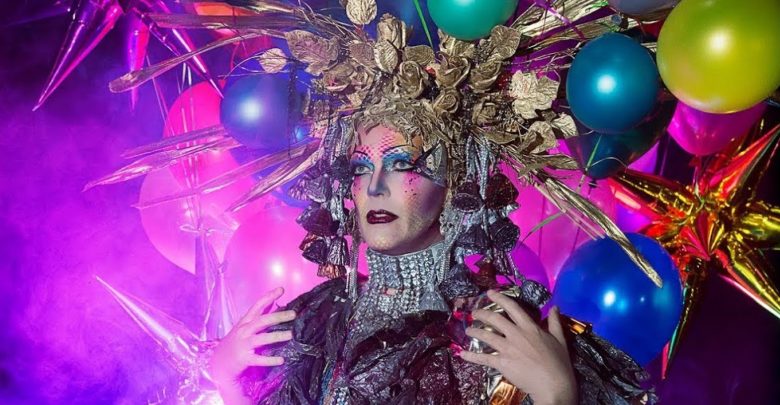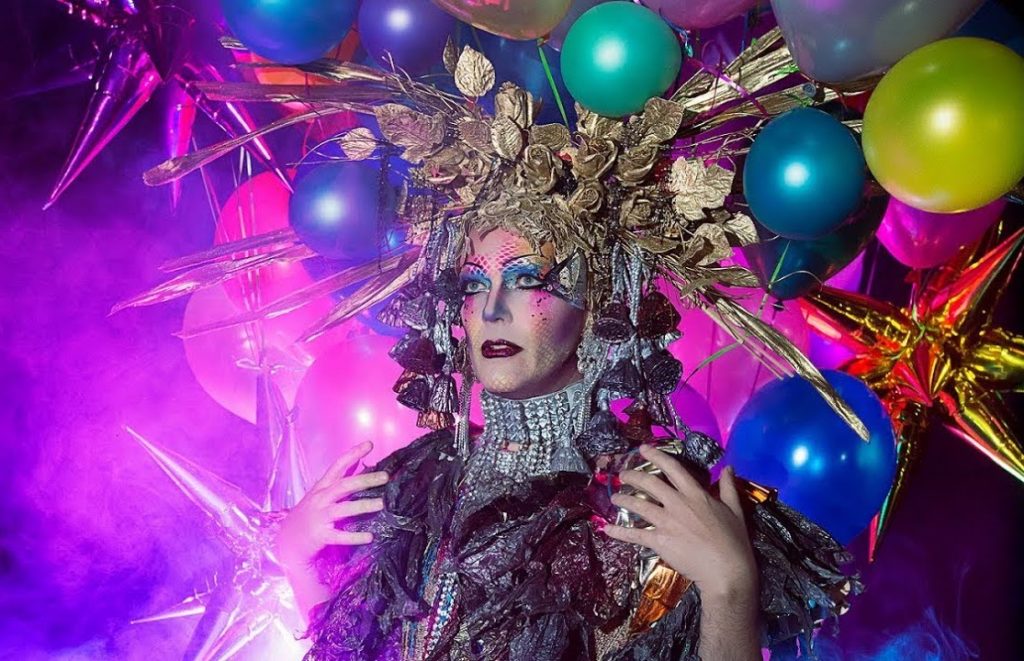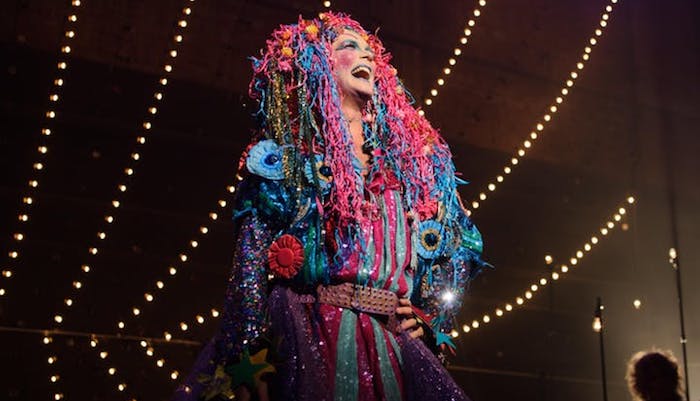
Taylor Mac Delivers 2019 Mitchell Artist Lecture in Houston
Queer "genius" chats about LGBTQ history and the future.

Decked out in a kaleidoscopic array of balloons, sequins, garlands, and spray paint, the New York downtown cabaret essential Taylor Mac has cemented his legacy as one of theater’s most daring innovators with his magnum opus, the 24-hour-length A 24-Decade History of Popular Music, which abridges each decade of our cultural mythology into an hour of live song. After touring sections of the work around the world—and even performing a legendary 24-hour marathon show last year—Mac wrote Gary: A Sequel to Titus Andronicus, which was nominated this year for seven Tony awards.
Before Mac presents the Mitchell Artist Lecture titled “What’s Going to Happen” at Cynthia Woods Mitchell Center for the Arts on November 5, he spoke with OutSmart about his experience building a queer history of the country, and how he views its future.
You just came back from Europe, right?
Yes! We were in Berlin doing our six-hour shows at the Berliner Festspiele.
What’s it been like to take A 24-Decade History of Popular Music from New York City across the globe?
It’s been emotional and wonderful and tiring, and a total joy—to hang out with my family in all different types of places, to share the work with people who didn’t grow up in the United States and don’t have the same shorthand for those kinds of things, and to work with translators and local artists. In Berlin, we worked with a man from Syria who was a refugee and found his new home in Berlin, and he had the most incredible singing voice ever. I don’t get that experience just by staying home. I like to travel around and work with lots of different artists and get to know the types of audiences.
You’re traveling quite a lot around the states, too, right?
For the most part, we built the 24 hours of material in the U.S. by touring the U.S. We had an untraditional rehearsal process, which is to say that we didn’t really rehearse—we just performed. But we performed a lot. We’d do 90 minutes of the show, do it again and again and again, add another half hour, then another. We’d keep working like that, instead of rehearsing 24 hours for six years behind closed doors and then sharing it with the audience.

A huge aspect of the show is this reexamination of history and historiography. Obviously, American history is viewed very differently, region by region. Has your experience of the show been informed by going to different areas of the country, where the relationships with the history and text vary?
It’s been educational, because audience members always want to come up and tell you about some historical thing that you’ve missed, or that you’ve never heard of. When we performed in South Carolina, a woman came up and wanted to tell me all about the Grimke sisters, who were abolitionist and feminist activists in the 1840s and ’50s. So then I researched them, and they ended up getting into the show at some point. We were touring to build the show and to learn. I don’t know about you, but I grew up in a public school system in the U.S. that was poorly funded, and I didn’t have the best education in terms of history, so part of the reason I did this show was so that I could learn about history. I used the going-on ten years of making this show to learn more, and take the time to actually do the research.
Queer people have a great sense of pride in how they, or their city, played a part in the country’s history.
It’s not always what you’d expect. In the American South, The Lady Chablis would say that the South is one big drag show. You may go to the South and think that people are going to be aggressive to you, and sometimes they are. But sometimes they’re more open to ideas in the South than in places like New England, where Puritan dominance over expression is a bit more ingrained in them. It’s a little bit more challenging to perform in New England than it would be in South Carolina. But in North Carolina we had a bunch of young guys who stormed out of the show in the first number because they were homophobes and offended that I was a drag queen. I guess they didn’t see the poster.
They couldn’t handle it?
In our show, I love a little slap-slap-rub-kiss. I kind of slap people, then I rub their face and give them a kiss. That’s part of the craft of what I do. Sometimes I do it the opposite way, which is “Yay, I love you, now I’m going to critique you.” But I mix it up. Sometimes, when I’m in places I think are a lot more conservative, I give an “I love you, I love you, I love you” and then the critique. And sometimes when I’m in places like New York, I’ll give critique, critique, critique, and then “I love you.” It depends on the energy from the audience and what I feel they’re game for. If they have their arms crossed when the show starts, then I ease my way into it. If they’re screaming and loving everything before we’ve even started, then I make fun of them a bit more from the beginning. You just have to juggle it.
On November 5, you’re doing a lecture under the title of “What’s Going to Happen.” I think about this a lot, because I have family members who are gun owners, who have a very pessimistic view of the future, and want to arm themselves for whatever happens. What I love about being queer is . . .
Things already went to hell! [Laughs] The worst is over!
Exactly! So how do you bring your queer sensibility to that outlook?
For me, I feel that the only thing that would be worse than being in a situation where you have to kill somebody is if you spend your entire life preparing to kill somebody. So I mean, live your life, have a good time. Why do you gotta have so much fear in your life? Why do you gotta make more fear? These shows like The Walking Dead, and things like that, always crack me up because they have this sense that survival is the most important thing in the world. And it’s like, do you really want to live during the zombie apocalypse? I’m one of those people that’s like, You know what? Life isn’t that precious. If it’s that bad, if everyone’s trying to eat you on the planet, maybe go to a different dimension. [Laughs] I don’t want to live in a world where I gotta have a gun in my pocket to feel like I can survive. That’s the world I’m trying to create, in terms of what’s going to happen. In the speech, I talk about “what’s going to happen” is more of a mantra to calm you down. It’s an acknowledgment that calamity is going to come into our lives, and that we are going to be able to transform it. That’s what I’ll be talking about.
What is it like to have to explain or literalize your work in places where you aren’t a very well-known character?
It’s funny. In most of the places I perform, most of the people have never seen us before. Which is why I like the durational shows, because in a 90-minute show it’s over before they can even get to know you—you know? But in the six-hour show or the 24-hour show, by the end you really have a stronger sense of each other. That’s why I like to go back to the same places again and again. I like the ritual aspects of theater. We don’t have a lot of ritual in our lives that aren’t sporting events or the church. And sporting events or the church ask you to have one point of view—you’re cheering for your team, even if that team is God. Theater is a ritual that allows you to feel many different things. You don’t have to cheer for just one thing. You don’t have to cheer for the performer. You don’t have to believe in the ideas of the show. It’s just asking you to use the full range of your consideration, and your ability to consider, in order to do that. So it’s many things instead of one thing, and that’s the ritual we need.
This is a long way of answering how I feel when I go places and have to explain who I am. I just see it as an invitation. I’ve never performed in Houston before, and I’ve never given a speech there before, so it’s just my way of saying, “Hi. Maybe we can hang out together again.” I see a 90-minute play as that as well. It’s an invitation to the work. Even a three-hour play. You go see Who’s Afraid of Virginia Woolf? that is an invitation to hang out with Edward Albee with the lineage of theater that Albee comes from, and the lineage inspired by him afterward. It’s an invitation to hang. Most theater is about invitation—how can you craft your invitation, not so that it becomes universal (because that is its own kind of oppression) but so that everybody feels invited to the party. Not in charge of the party, but invited to the party, for the hang. Increasingly, I’m in it for the hang: I want to hang with the audience, I want to hang with the collaborators. I don’t mind it. It’s part of the job.
On Tuesday, November 5, MacArthur “Genius” playwright, actor, songwriter, performance artist, director, and producer, Taylor Mac, will deliver the 2019 Mitchell Artist Lecture, “What’s Gonna Happen?” For ticket information, click here.
Watch the trailer for Taylor Mac’s A 24-Decade History of Popular Music below.










